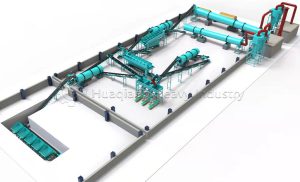The trough composting process is a common organic fertilizer fermentation method. Now Huaqiang Heavy Industry will briefly introduce it. 1.5 tons of raw materials (about 2.5 tons of fresh feces) are added with 1 kg of fertilizer fermentation agent. The fermentation agent needs to be mixed with rice bran (or bran, corn flour and other substitutes) at a ratio of 1:5, and then evenly sprinkled into the raw material pile and mixed evenly.
The composting work of each fermentation pool is completed by a fermentation compost turning machine and a pool changing car. Every day, organic solid waste is mixed with auxiliary materials such as plant straw and fermentation bacteria according to the formula requirements. After being fully mixed by a forced mixer, it is evenly sent to the front end of each fermentation pool (1/8 of the original empty pool front end or 1/8 of the pool front end vacated after turning the compost) by a forklift, and the compost is turned twice a day. The thickness of the fermented materials in the pool is 1.5-1.6 meters. The materials are forced to ventilate with high-pressure fans and the oxygen provided by the contact between the materials and the air during the composting process is continuously aerobic fermented, so that the fermented materials can be quickly decomposed, sterilized, deodorized, dehydrated and dried. The fermentation cycle is 7-8 days. Every day, the fermented materials are transported away from the end of the fermentation pool (the processing volume of one day, 1/8 of the pool length), and the space vacated at the front end of the fermentation pool (the processing volume of one day, 1/8 of the pool length) is replenished with new fermented materials, thus forming a continuous aerobic fermentation process. The fermentation and composting process is fully automatic and intelligently controlled. After the fermented materials of the organic fertilizer production line are aged, further decomposed and dehydrated, they are screened to obtain powdered finished organic fertilizers, or used as raw fertilizers for granulating granular organic fertilizers.
Advantages and disadvantages of trough composting process: Relatively small footprint: high construction cost, fermentation tanks need to be built; high degree of automation, more thorough decomposition; trough composting machine needs to be customized according to the width of the trough, and the installation cost is high.
The trough composting process is suitable for: refined and large-scale production, materials that are not too sticky, strict requirements for reducing labor and land costs, and large-scale fertilizer manufacturers.



